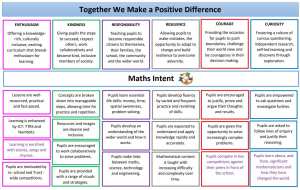Our aim at Fosse Mead is to ensure all children are competent and confident mathematicians at all stages in their learning. We provide a curriculum which caters for the needs of each child and provides them with the necessary skills and knowledge for them to become successful lifelong learners. Teaching is based around the White Rose Maths resources and small steps for learning allowing all children to develop robust mathematical understanding.
Our maths lessons are focussed around our Academy Values and are designed to be fun, fast paced and engaging. We encourage all children to find joy in being challenged and to show their resilience in rising to these challenges.
Children are able to develop their understanding by moving through Fluency, Application and Problem Solving steps.


Subject Policies
WRM Multiplication and Division policy
WRM Addition and Subtraction policy
Calculation Methods at Fosse Mead
Subject Leader
Liam Johnson
